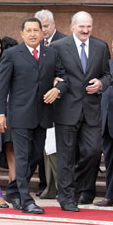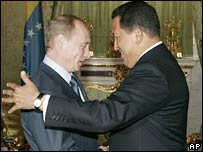Cold Civil War (...or is it Civil Cold War? Which do you think sounds better?) Another march in Caracas today, a really bloody big one this time. I'm no expert, but it looks like the better part of a million people are out there waving flags and blowing whistles. They cover all 6 lanes of the East-side Highway for about a mile or so at this point, and many more people are joining from every part of town.
This is happening as the country more or less crumbles to bits. Gasoline has run out almost entirely everywhere in the country except for Caracas, where about half the stations have run out and the other half will run out within a day or two. Cab-drivers and bus drivers, who live hand-to-mouth, are getting pretty desperate in some places. The government is now talking about
importing gasoline (think of that! That's like an emergency shipment of cameras into Japan!) An assembly of several thousand Caracas-area PDVSA managers have disowned the authority of the National Government and declared themselves in charge of the company. Staple foods are running low all over the place. The crisis is deep, all-encompassing, the situation couldn't really get much more dire. There's no shooting yet, but short of that it's hard to see how things could get worse. Some pundits are calling it a Cold Civil War.
And the president's response in this hour of direst national emergency?
"There is no strike in Venezuela, what we have is an oil-industry conspiracy by managers that have started to sabotage."
That's just one shard from
his weird-ass interview with CNN yesterday. He then went on to claim victory over the strikers, because a half full tanker, the Josefa Camejo, managed to sail off to the US two days ago - the only ship that's left a Venezuelan port in a week, a period when we normally would've sent out over 40 tankers.
His insistence that the entire mess boils down to a few sabotage attempts on the part of a handful of hyperprivileged oil executives is really just crazy. I mean that quite literally: if you can't tell how incredibly dire the situation here is, you have a serious psychiatric problem.
Even Cesar Gaviria, the international mediator trying to knock some sense into the government's head, is sick of it, calling the denial a main impediment to negotiations.
Chávez's position is so crazy it's becoming ever harder for Chavista spokesmen to tow the official line. So this morning, for instance, if you checked out the Union Radio web-page (required reading for Venezuelan politics junkies) the two top headlines you would have seen were
Vicepresident Rangel: "The Situation in the Oil Industry has Improved Notably" and
President of PDVSA Recognizes: The oil industry is "mostly paralized."OK, so which one is it, guys?
So with the president locked in his own private reality, even his top lieutenants having a hard time defending his psychotic PR line, and the country falling to small bits, the future has never been more uncertain.
Thankfully, now that oil shipments to the US have been cut off for almost a week, Washington is finally getting its ass in gear. In a significant departure from previous policy,
the White House is now calling for Early Elections as part of a settlement. The government's negotiators are still stalling; Gaviria is having a harder and harder time coming up with creative ways to put a positive spin on negotiations, and the opposition is emboldened by the day. The president is locked in his own private little warped head-world. We've tried everything we can think of to get this guy to reason with us. We've begged for a negotiated settlement, we've whimpered for referenda, we've pleaded for elections, but he continues to talk as though we don't exist.
What next? Who can tell?
Please comment responsibly:
|
Crisis? What crisis?The BBC News write-up is hysterical. José Vicente Rangel's story is, of course, an incredible howler, and this guy knows it. Of course, it's the BBC, so the writer can't quite launch into attack mode like, say, I can. Still, the guy manages to write it in a way that leaves you in no doubt that Rangel is full of shit.
Take a minute to read through it, it's fun.
Of course, this guy has to stay within a certain set of boundries. There are standards of politesse that make it impossible for this dude to write something like "in an amazing bit of wishful (or delusional) thinking, Venezuela's Vicepresident José Vicente Rangel tried to snow under the BBC with one of the most outrageous, absurd, screaming lies this reporter has seen in years." That probably wouldn't make it past the editors in London. But it's clearly what he wanted to say. This dude is obviously angry, personally offended that Rangel's thinks he can put this shit past him.
The write-up showcases what I was trying to get at with my entry on the media a couple of days ago. BBC man (it's too bad there's no byline) is so incensed at the government's blatant mendacity, you can see it's actually made him angry. He feels this overpowering need to show Rangel as a fraud, to write in a way that leaves no doubt in the reader's mind that this guy is an asshole. The thing is, Venezuela's independent journalists have been dealing with that same urge for
four years now! It's just been going on much much longer here, and it's gone much much further. On top of that, journalists here are not hamstrung by editors who insist on keeping a veneer of editorial politeness. So they let it rip, again and again, leading to the weird one-sidedness in the Venezuelan media I wrote about a few days back. At heart, though, they're just pissed at a government that lies so so much, and so so artlessly.
As this journalist has figured out, merely reporting Rangel's words at face value would give them a patina of legitimacy they plainly don't desserve. "Balance" in this case would make him an accomplice to a ridiculously obvious dissinformation campaign. And he's not willing to play along. But, guess what? That`s precisely the position most Venezuelan journalists have spent the last four years in. So the piece basically showcases, in embryonic form, the sentiments that have led almost every independent journalist in Venezuela to become an aggressive government critic over the last four years.
It tickled me pink, really.
Please comment responsibly:
|
Three scenariosFor years, it’s been the proverbial “nuclear option” for the opponents of successive Venezuelan governments. Protests and strikes might embarrass or pressure a government, but ever since 1936 Venezuelans have known that the ultimate tool against a petrostate is to cut off its lifeline: the oil industry. The notion of a massive oil strike has a kind of iconic status in Venezuelan political life as the final, most radical course of action possible. For over 65 years, it remained just an idea. No one had ever been able to really turn it into a reality. Until now.
PDVSA has shut down as comprehensibly as it is possible for PDVSA to shut down. The company is no longer selling either crude oil or refined products, its tankers are at a standstill, its refineries are either at a complete stop or running at a tiny fraction of capacity – just enough to keep the machinery in working order and produce enough natural gas to keep the nation’s stoves and power-plants burning, and enough chlorine to keep the nation’s water drinkable. Gasoline is becoming an increasingly rare commodity. The fiscal hit will be massive – at least $25 million per day in lost government revenue.
In short, PDVSA’s dissident managers have crossed the Rubicon; they’ve gone well beyond the point of no return. They are fully aware that their careers are on the line: if this strike fails, they’ll all be fired, and they’ll likely watch their country morph into a Cuban style regime. So, not unlike the government, the dissident oil managers have fallen prey to the logic of unending escalation. At any given juncture, pressing forward looks more appealing to them than backing off. The consecuences of these parallel strategies could be, literally, explosive. The fate of the nation hangs in the balance.
The government’s response, meanwhile, is guaranteed to exacerbate the conflict. Led personally by the president, the government has launched a campaign of perpetually intensifying vilification and intimidation against its opponents, a drive whose only effect has been to embolden its critics and add to the crisis. At times, it seems as though the government is maliciously seeking to escalate the crisis beyond all control, as part of a plan to achieve God-only-knows what.
It’s true that the private media has hardly been impartial throughout the crisis, often acting as an conglomeration of opposition propaganda organs. But the government’s attempts to intimidate the private TV networks by sending hundreds of followers to bang pots outside their studios (in Caracas) or actively vandalize the premises (in the rest of the country) has left it looking precisely like the intolerant, authoritarian regime it is. And the chavista attempts to subdue the striking oil workers and merchant marine sailors through military force and intimidation has left them looking a fool: not only have these attempts been remarkable operational failures, but they’ve also turned into spectacular public relations debacles, showing the regime’s ultimate impotence in the face of an organized society determined to disobey its authority.
At times, it seems like the government is stuck in a pit of quicksand: the more fiercely it struggles to lift itself out, the quicker it sinks. As everyone knows, there is only one way to make it out of the quicksand alive, and that’s to avoid panic, quit making moves that make the situation worse, and reach out to those who might be able to help. Will the government ever get it, or will it keep antagonizing and insulting those who might imaginably throw it a lifeline?
The question on everyone’s lips is “where does the crisis go from here?”
VenEconomy cannot, obviously, predict the future, but it can help you think about the future in a structured way, through scenario-based forecasting. At this point, there seem to be three broad routes the crisis could unfold.
1-Negotiated agreement: At some point in the next few days, faced with a patently unmanageable crisis, the government could be forced back to the negotiating table. Having run out of options after its attempts to return PDVSA to operation through military intimidation fail completely, Chávez might accept a tactical retreat like he did on February 4th, or April 11th. Perhaps pushed by a stern statement from upper-echelon chavistas or by the military high command, the President could finally order his negotiators back to the table with unambiguous instructions to reach a compromise agreement. The nation would then head to some sort of electoral arrangement, with the opposition accepting Chávez as a candidate in an election he would be almost certain to lose. This is the option favored by the catholic church, Kofi Annan, Jimmy Carter, César Gaviria, and every moderate in Venezuela, and it’s patently the least destructive, most sensible and democratic way out of the impasse. That, in itself, makes it unlikely to be accepted by Chávez.
2-The strike fizzles: At the moment, the momentum seems to be on the side of the opposition, but that could change. Through a mixture of threats and lavish strike-breaking bonus payments, the government might still be able to lure back enough PDVSA workers to operate the industry. As time wears on, the opposition could tire of street protests, coming to see the nightly cacerolazos as a waste of time and energy. It would take tremendous political skill, and, especially, a lot of restraint, for the government to pull it off. But it’s not entirely impossible. The opposition would find itself in a terribly awkward position, urging people to spend Christmas eve banging on pots and pans even while the government manages to restore gasoline supplies and oil shipments, taking much of the wind out of the strikers’ sails. PDVSA’s dissident managers would find themselves marginalized, and the government in a stronger position than ever before.
3-Train wreck: The current stalemate drags on indefinitely into the future. In this scenario PDVSA’s managers stand their ground, but so does the government. Though the situation on the ground becomes worse and worse, neither side will give in – like a game of Chicken taken to its logical extreme. The government continues to refuse a negotiated solution, but increasing gasoline shortages cause greater and greater problems throughout the economy and society, eventually, perhaps, even endangering electricity and domestic gas supplies. With radicalism increasing on either side, this is the truly explosive scenario. It entails the increasing likelihood of some sort of violent outcome. Faced with a real national emergency, the government would be constitutionally justified in declaring a state of exception, which the opposition would be certain to defy. With increasing numbers of people on the streets, the potential for violence would multiply, as would the chances of some sort of military intervention, from one side or the other. The scenario could even lead to a total breakdown in law-and-order, a much feared “social explosion” along the lines of Feb. 27th, 1989.
In short, the much over-used cliché is now an understatement: Venezuela is at a decisive crossroads. The decisions of the next few hours and days will determine the nation’s fortunes for years to come. And while the country is fortunate to enjoy an increasingly cohesive and highly conscious opposition movement, it’s cursed with a government that seems not to know how to de-escalate, whose one-size-fits-all response to any and every juncture is to press ahead, no matter how dangerous an escalation might be, how much closer to the edge it might take the country.
Please comment responsibly:
|
Lies, damn lies, and channel 8Turn on the television in Venezuela, any channel, any time, and you're in the thick of it. Every day, on every station, all you see is news. No more cheesy American sitcoms, no more soaps, no more game shows, not even baseball. It's gotten to the point where they don't even show commercials anymore, just running commentary on the political crisis every minute of every day. (Well, except for the folks at Channel 5, who, God bless them, stick doggedly by their animal documentaries.)
The media overload goes a long ways towards explaining the pervasive climate of tension here. But it's more troubling than that, because the media have abandoned any semblance of fair reporting, any pretense of balance. You have six channels. The five private networks show non-stop antigovernment propaganda, some of it more shrill, some of it less so, some of it better grounded in reality, some of it frankly fantastic, but all of it opposition minded. And then you have Channel 8, the state run channel ("The channel of All Venezuelans" as the slogan goes) which shows a never ending stream of chavista pap, almost all of it blatantly, aggressively false.
Now, professional journalistic ethics have been tossed overboard on both sides, it's true. While I’m obviously an opposition journalist, I'm sane enough to realize that much of what the private media peddles is pretty thin gruel. But while there are exaggerations and distortions, certainly, and an appalling absence of balance, I know for a fact that most opposition journalists are trying to get at the truth most of the time. (It just happens that the truth is most often terribly inconvenient to this government.)
In that respect, there's a fundamental difference with Channel 8, which resembles nothing more than your standard issue totalitarian dictatorship propaganda organ. There's a willfullness to the disinformation on Channel 8, a shamelessness to it, a kind of aggressive aversion to telling the truth that the private media very rarely stoops to. There are taylor made agitprop videos, endlessly repeated, peddling aggressively distorted versions of reality on issues ranging from the April 11th massacre to supposed opposition coup plots. The private channels distort and exaggerate, slant and stretch, but they rarely go out of the way to lie the way Channel 8 does. Aggressively. Willfully. All the time.
It creates a strange kind of dual reality. Switching from a private channel to channel 8 and then back again it's scarcely believable they're both reporting the news out of the same country. It scares the hell out of me to realize that there are millions of people, millions of chavistas in this country who rely exclusively on channel 8 for their news, who eat that crap up with mustard. I understand the rage this causes in opposition circles, I understand the need opposition journalists feel to counteract the unending barrage of government lies. I share their frustration at the fact that almost every government spokesperson you interview lies to you openly, to your face, with no compunction at all. I don’t think it does the cause of objectivity any good at all to report, with a straight face, President Chávez’ earnest report that he has followers who are in touch with extraterrestrial civilizations, and that they support him all the way, just to pick an especially weird example. But I'm also well aware that the opposition media have created their own oddly warped reality, a reality that's much closer to the real reality than channel 8's reality, for sure, but which is still fundamentally distorted.
For the private media, chavismo is a weird sect followed only by a tiny fringe of far left drunkards, rabble rousers and violent, trigger-happy thugs - the lumpenproletariat. As far as the private channels are concerned, Hugo Chávez is basically Fidel Castro waiting to happen - it makes little difference to them that Chávez has never shut down an opposition TV station or newspaper, imprisoned an opponent or that he was democratically elected. He is a communist dictator, period. As far as the private media are concerned, there were no social divisions in this country before Chávez, no class tensions at all. Income inequality was politically meaningless. And Chávez created all of these problems singlehandedly, out of thin air, through his rhetoric.
Now, all of these are serious distortions of the nation's reality, there's no doubt about that. But they are Pulitzer-worthy examples of objectivity compared to the alternate universe on display at Channel 8. For the state-run media, the opposition is basically a satanist neonazi conspiracy. Literally. For a while the state media showed an agitprop video "demonstrating" that the opposition was secretly led by members of a neonazi satanist cult called TFP. Channel 8 is committed to the notion that there is no such thing as a mass opposition movement, that it's all a giant media lie, a conspiracy to magnify the view of a tiny cabal of obsenely rich conspirators bent on screwing over the poor. The PDVSA managers, in fact, everyone in the opposition, are not merely political opponents but enemies, terrorists, coup mongers. The public line about demanding elections is a hoax, a cover for a reactionary plot. Nothing that Chávez has ever said or done has ever been wrong. And the opposition isn't merely wrong, but actually evil.
Both media visions are out of line, but they're out of line in fundamentally different ways. The private media's version is based on a solid foundation of facts, facts that are often taken too far. Channel 8, on the other hand, is psychotically detatched from reality.
Channel 8's version of the world reflects nothing so much as the government's own ongoing difficulties with reality. The private media massively overindulge their propensity for wishful thinking, but the public station, much like Chávez himself, is locked in a reality all its own, built on a foundation of pure lies.
Which doesn't excuse the private media's bias. But it does, to a certain degree, explain it. It hardly seems sensible to give equal time to an opposition that, while flawed, is essentially sane alongside a government that, deep down, really is crazy. Do you really serve the interests of truth and objectivity when you adopt a he-said-she-said approach even while you know that one side, for all its faults, is basically trying to get at the truth while the other side is blatantly and systematically lying? And doesn't the overwhelming human duty to resist a government that's founded on a bedrock of deception overwhelm the dictates of standard journalistic ethics, dictates designed for reporting on situations where all sides act, more or less, in good faith?
I don't know the answers to these questions. I do know that even for someone who strongly opposes the government, as I do, the private media is going too far. It's one thing to ignore government spokesmen when they make absurd claims, like saying that Joao Gouveia is on a CIA payroll, but it's quite another to simply blackout any coverage of chavista marches that turn out 100,000+ marchers. Maybe I'm naïve to think there's still room for some sort of middle ground given the incredibly accute political strife we're going through here, but I sure wish I had some source of news willing to tell me the truth even if when it doesn't happen to be convenient to its side of the divide.
Please comment responsibly:
|

 Chavez Reelection Blog: Katy documents the government's use of public resources for Chavez's partisan advantage.
Chavez Reelection Blog: Katy documents the government's use of public resources for Chavez's partisan advantage.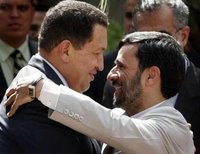
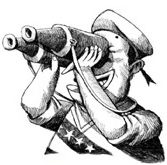
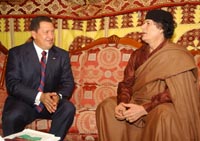
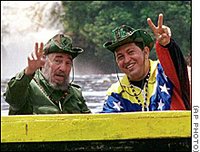
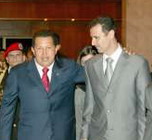
 Site feed
Site feed 